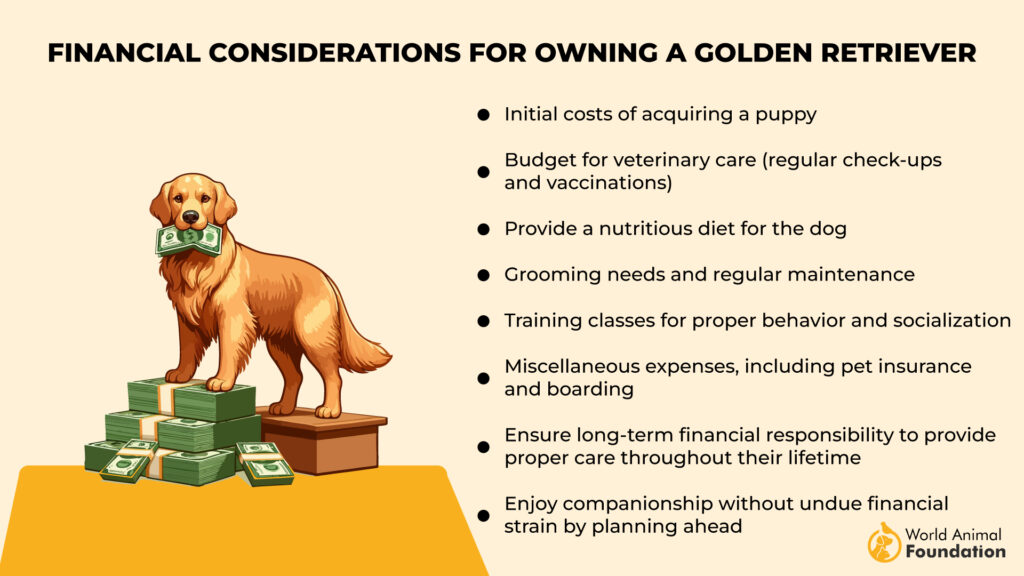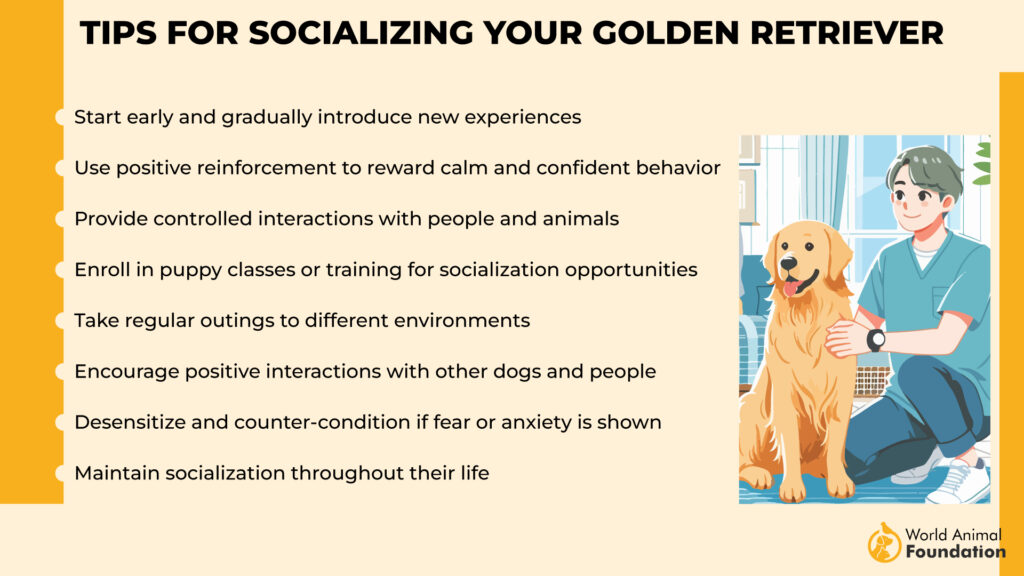Golden Retrievers: the quintessential family dog. Their sunny disposition and playful nature are undeniably appealing, but is a Golden right for you? This exploration delves into the joys and realities of owning this beloved breed. We’ll uncover the benefits, from their trainability and gentle temperament to their love for activity. But we’ll also address the challenges, including grooming demands, potential health issues, and the commitment required to meet their energetic needs. Weigh the pros and cons with us to determine if a Golden Retriever is truly your golden ticket to canine companionship.
Golden Retrievers have been one of the most beloved dog breeds in the United States for decades, and it’s easy to see why. With their gentle temperament, loyal nature, and undeniable charm, Golden Retrievers have captured the hearts of dog lovers around the world.
From their wagging tails to their soft, shiny coats, they have a way of brightening up any room with their joyful presence. Their smiling faces and affectionate personalities make them perfect companions for families, individuals, and even as working dogs.
However, before you bring a Golden Retriever into your home, it’s important to consider if they’re the right fit for your lifestyle. While their friendly demeanor and beautiful appearance are appealing, these dogs have specific needs and require plenty of attention, exercise, and grooming. Goldens won’t be happy in every situation, especially if their needs aren’t met.
So, before you fall in love with their silky ears and playful spirit, let’s explore the pros and cons of owning a Golden Retriever to help you make the best decision.
Pros and Cons of a Golden Retriever
The Golden Retriever is a sporting dog breed that was developed in Scotland during the 19th century. Originally bred to help hunters retrieve game birds, they are known for their strength, endurance, and excellent swimming abilities. These dogs typically stand between 21.5 to 24 inches tall and weigh between 55 to 75 pounds.
According to Britannica, all Golden Retrievers can be traced back to a litter born in 1868 at Guisachan House, owned by Dudley Coutts Marjoribanks in the Scottish Highlands. One of the breed’s most famous members, Liberty, was often photographed with President Gerald Ford during his time in the White House.
Now, let’s take a quick look at the pros and cons of owning a Golden Retriever.
Pros of the Golden Retriever
Intelligence and Trainability
Golden Retrievers are known for being one of the smartest dog breeds, which makes them highly trainable. Their intelligence, paired with a natural eagerness to please, helps them do well in obedience training. They learn quickly and are generally easier to train compared to many other breeds. However, owners should still be prepared to invest time and patience into their training to see the best results.
You can easily train Golden Retrievers to do a variety of tricks and follow simple commands. Their friendly and affectionate nature makes them eager to please, and they absolutely love being praised with pats and pets. Hearing they’re a “good boy” or “good girl” brings them great joy, making training a positive experience for both the dog and the owner.
Great temperament
Golden Retrievers are friendly, trustworthy, and always eager to make their families happy. Their playful, joyful nature sticks with them well into adulthood, giving them a puppy-like spirit throughout their life. Known for being outgoing and enthusiastic, they love retrieving both on land and in water.
AKC notes that Golden Retrievers are affectionate and loyal, making them an excellent choice if you’re looking for a friendly, easygoing dog that thrives around people. Known for their extroverted nature, most Goldens love meeting new people and are naturally sociable. With proper socialization, they also tend to be less anxious compared to other breeds.
Low Aggression Breed
Golden Retrievers are known for their gentle and calm temperament, which is a key trait of the breed. They have been bred for generations to be tolerant and patient, making them naturally less prone to aggression toward humans or animals. Unlike some working or guard dog breeds, Golden Retrievers have been selectively bred for their friendly, easy-going nature.
Because of this, they rarely account for dog bites or attacks, especially when compared to breeds like pit bulls. With their sweet, eager-to-please personalities, Golden Retrievers are well-suited for both family homes and public service roles when given proper care.
Food-Motivated for Easy Training
Golden Retrievers are highly motivated by food and play, which makes training them easier. Using treats as rewards during training can be very effective in encouraging good behavior, but it’s important to avoid giving them table scraps, as some human foods aren’t safe for dogs. Golden Retrievers are eager to please and typically pick up basic obedience training quickly.
Keep in mind that Goldens have a lot of energy and can sometimes forget they’re no longer small puppies, even after they’ve fully grown. Their playful and energetic nature means they need regular activity, but with patience and consistency, training them can be a rewarding experience.
Compatibility with Families and Children
Golden Retrievers are known for their gentle and friendly temperaments, making them fantastic family dogs. While some breeds may be fearful or aggressive toward small children, most Goldens love kids of all ages. They’re playful, yet not too rough, making them ideal companions for little ones. According to Petplan, their soft nature and fun-loving personalities have made them a popular choice for families.
Goldens are naturally good with children and rarely snap or bite, even in energetic or chaotic environments. They thrive in busy households with kids and get along well with other pets, making them a perfect addition to any family.
Cons of the Golden Retriever
Not a Vocal Breed
According to Hills Pet, Golden Retrievers are not known to be frequent barkers and lack the strong guard instincts of other breeds, so they don’t make great guard dogs. However, some Goldens may alert you when strangers are nearby. In terms of barking behavior, Golden Retrievers fall somewhere in the middle.
They may bark during play or if something seems wrong, but they are not the type to bark excessively. Additionally, they typically don’t bark at strangers or other animals, making them a good fit for homes with frequent visitors or those in busy neighborhoods.
Sometimes They Can Be a Little Smelly
Like any dog, Golden Retrievers can sometimes have a noticeable doggy odor, so regular bathing and good hygiene practices are important. By maintaining a consistent grooming routine, you can keep your Golden smelling fresh and clean.
While they aren’t typically a breed with major odor concerns, it’s still essential to keep up with their hygiene, including brushing their teeth, to ensure they stay healthy and odor-free.
Not Ideal for People Away from Home Often
Golden Retrievers are true people-dogs, and they love spending time with their human families. If you’re considering getting a second dog, Goldens usually adapt well, as they thrive on companionship. However, they don’t do well when left alone for long periods, so they may not be the best fit for people who are often away from home.
Like all dogs, they need supervision around young children, and extended time alone can lead to behavioral issues and separation anxiety. Keeping them engaged and surrounded by loved ones is key to their happiness.
Highly Active Dogs
Like most Sporting breeds, Golden Retrievers require plenty of daily exercise to stay healthy and well-behaved. Without enough physical activity, they may develop unwanted behaviors due to boredom. Goldens make excellent companions for long runs or bike rides, but it’s a good idea to consult with a vet before starting high-impact activities that could strain their bones and joints.
According to PDSA, many Golden Retrievers also enjoy getting their exercise through hunting trips, field trials, or participating in canine sports like agility, obedience, and tracking, which keep them both physically and mentally stimulated.
They Shed Heavily
Golden Retrievers shed their thick, water-repellent double coat heavily once or twice a year, with moderate shedding happening year-round. Regular grooming is key to managing this. A good brushing with a slicker brush once or twice a week helps remove dead hair before it gets on furniture, and during heavy shedding periods, daily brushing is needed.
Bathing can help loosen dead hairs, but it’s important to wait until the dog is fully dry before brushing. Goldens only need occasional baths for cleanliness, and like all dogs, their nails should be trimmed regularly to maintain their health.
Is A Golden Retriever Right For You?
Determining whether a Golden Retriever is the right dog for you starts by assessing your lifestyle. These dogs are active, loving, and thrive in a family environment, so it’s important to consider how you might need to adjust to meet their needs and ensure a happy life together.
Golden Retrievers love spending time with their people and being involved in family activities. They need plenty of attention and affection, so be sure you have the time to dedicate to them. They will quickly become a key part of your daily routine and offer you lots of love in return.
Additionally, Golden Retrievers are fond of water and enjoy swimming. It’s worth thinking about whether you have access to safe places for them to swim or if you’re willing to find opportunities for them to cool off and enjoy some fun water activities.
Final Thoughts On Golden Retriever Pros & Cons
Owning a Golden Retriever dog comes with both rewarding and challenging aspects. Golden Retrievers tend to be affectionate, loyal, and energetic dogs that make excellent family companions, especially for homes with small kids and other dogs. Their friendly nature, combined with their intelligence, makes them ideal for service dog roles and agility competitions.
However, Golden Retrievers require plenty of exercise and mental stimulation, as they can develop destructive behaviors without enough activity and human interaction. Their beautiful coat adds to their charm, but it also requires regular grooming to keep it healthy.
On the flip side, Golden Retrievers are prone to certain health issues, such as hip dysplasia, which can develop from a young age. It’s important to invest in pet insurance to cover potential health problems and ensure you’re adopting from a reputable breeder to minimize risks. While they are not known to be good guard dogs, their loyal and friendly nature makes them a great family dog.
By understanding both the pros and cons, you can determine if a Golden Retriever is the right fit for your family and lifestyle compared to other breeds.
Golden Retrievers, with their sunny disposition and playful nature, make wonderful companions. Their intelligence and eagerness to please translate to easy training, making them excellent family pets and service dogs. However, potential owners must consider the commitment involved. Goldens require substantial exercise, regular grooming to manage shedding, and can be prone to certain health issues. Ultimately, the decision to welcome a Golden Retriever should be based on a realistic assessment of one’s lifestyle and ability to meet their needs. Their boundless love and loyalty make the effort worthwhile for many.













